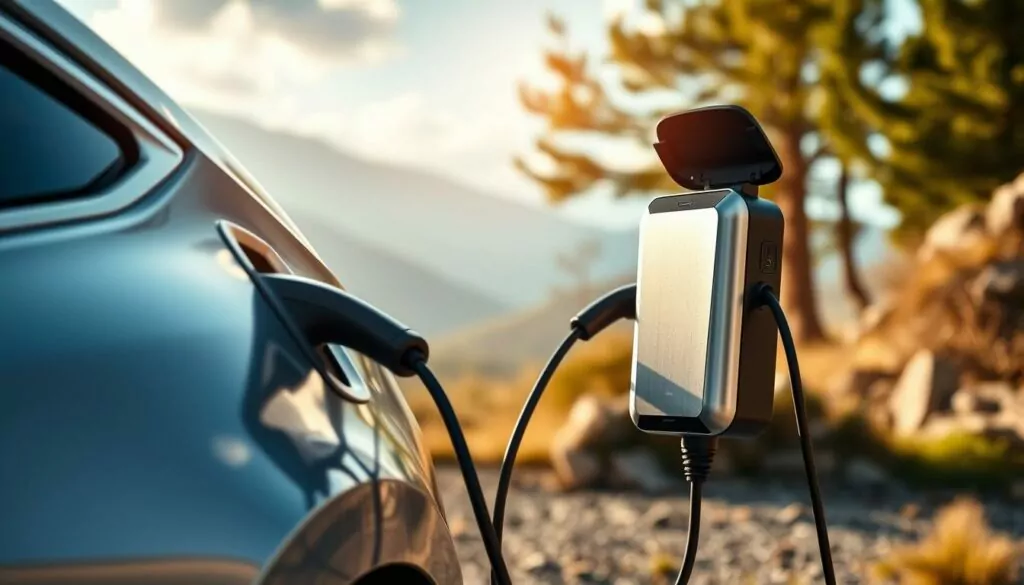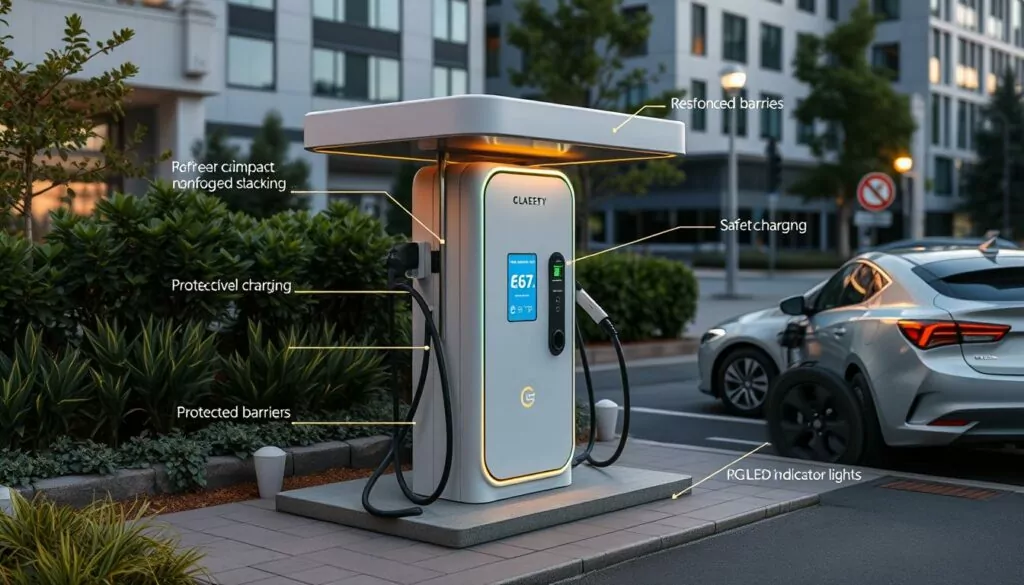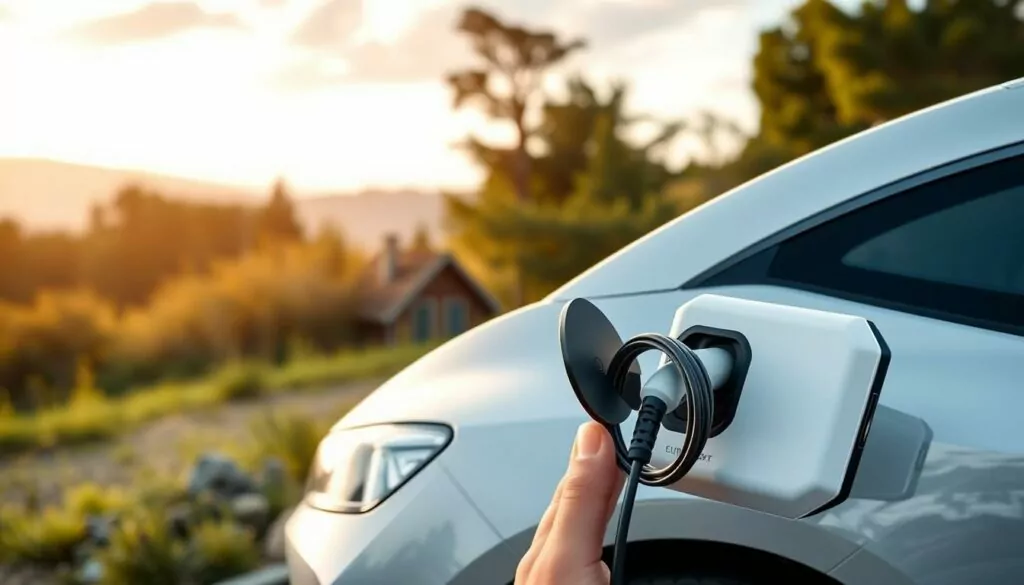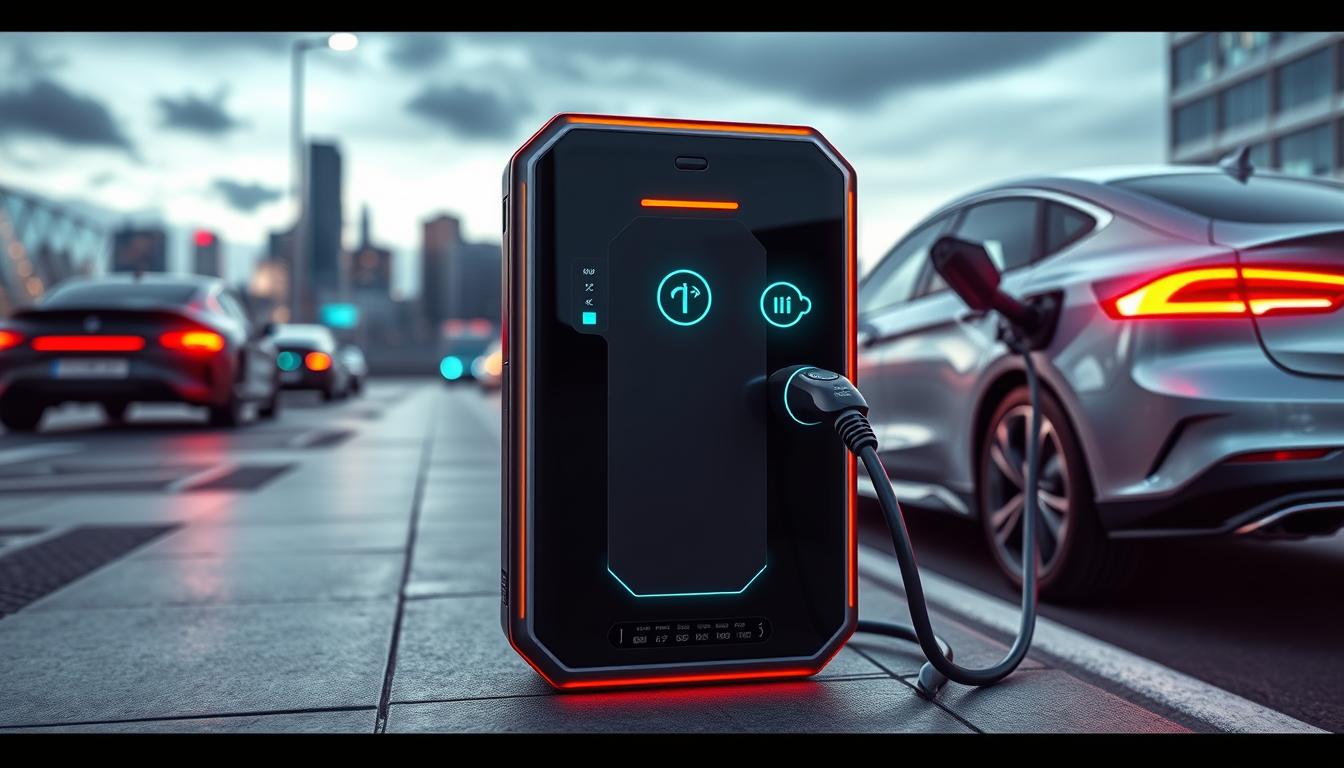Imagine driving your electric car when you notice the battery level dropping fast. The next charging station is far away. This is where portable chargers for electric cars become crucial. They’re a game-changer for EV enthusiasts like you.
These compact devices offer peace of mind during long trips. They free you from fixed charging stations. With a portable charger, you can explore without limits.
On-the-go EV charging solutions are now a necessity. They transform how we think about EV range. These powerhouses equip you to handle any charging challenge.
A portable charger in your trunk acts as a safety net. It lets you push your EV’s boundaries. You’ll have backup power whenever you need it.
These innovative devices are reshaping the electric driving experience. They’re adapting to increasing EV adoption rates. Mobile EV power banks enhance travel convenience for all electric vehicle users.
Key Takeaways
- Portable chargers reduce range anxiety for EV owners
- On-the-go charging solutions offer flexibility for unexpected situations
- Mobile EV power banks enhance travel convenience
- Compact chargers serve as a safety net for extended trips
- Portable charging options are adapting to increasing EV adoption rates
- These devices allow for more adventurous electric vehicle use
Understanding Portable EV Charging Solutions
Portable EV charging solutions are revolutionizing how electric car owners power their vehicles. These devices offer flexibility for drivers on the go. They provide peace of mind during long trips or unexpected situations.
Types of Portable EV Chargers Available
EV charging cables come in two main types: Level 1 and Level 2. Level 1 chargers plug into standard 120V outlets, ideal for overnight charging. Level 2 chargers use 240V outlets, delivering faster charge times.
Portable EV battery packs offer a unique solution. They provide power without needing an outlet, perfect for emergencies or remote locations.
Power Output and Charging Speeds
Mobile EV power banks have varying power outputs. Level 1 chargers typically provide 1.4 kW, while Level 2 can offer up to 19.2 kW. Charging speeds depend on your car’s acceptance rate and the charger’s output.
A 50 kW charger can add about 3 miles of range per minute to most EVs. This makes it a great option for quick top-ups during long trips.
Compatibility with Different EV Models
When choosing a portable charger, compatibility is crucial. Most EVs use the J1772 connector for Level 1 and 2 charging. For fast charging, there are three main standards: CCS, CHAdeMO, and Tesla’s proprietary connector.
Always check your car’s manual to ensure you select a compatible charging solution. This will help avoid any issues when you need to charge your vehicle.
| Charging Type | Power Output | Charging Speed | Compatibility |
|---|---|---|---|
| Level 1 | 1.4 kW | 3-5 miles per hour | All EVs (J1772) |
| Level 2 | 3.3-19.2 kW | 10-60 miles per hour | All EVs (J1772) |
| DC Fast Charging | 50+ kW | 3+ miles per minute | Varies (CCS, CHAdeMO, Tesla) |
Benefits of Investing in a Portable Charger for Electric Cars

A portable charger for your electric vehicle offers endless possibilities. These travel-friendly power supplies let you explore without worrying about battery life. You can enjoy spontaneous road trips without range anxiety.
These chargers provide incredible flexibility. You can top up your battery anywhere, anytime. This convenience saves you time and money in the long run.
Portable chargers are true lifesavers in emergencies. They act as a backup power source when you’re stranded. It’s like having a safety net for your electric car adventures.
- Increased range confidence
- Flexibility for spontaneous trips
- Emergency preparedness
- Time and cost savings
A portable EV charger is a smart investment for electric car owners. It gives you peace of mind and expands your travel options. You’ll always be ready for unexpected situations.
More EV drivers are making portable chargers essential. They’re a key part of the electric car experience. With these benefits, it’s easy to see why.
Essential Features to Look for in Mobile EV Power Banks

Choosing a portable charger for your electric vehicle requires careful consideration. Key features can greatly enhance your charging experience. Let’s explore what to look for in compact EV charging stations.
Safety First
Safety is crucial when dealing with high-voltage equipment. Look for power banks with UL or CE certifications. These ensure the device meets strict safety standards.
Many quality chargers include built-in protection systems. These safeguard against overcharging, short circuits, and overheating.
Portability Matters
The main advantage of a mobile charger is easy transport. Lightweight EV power banks are ideal for travel. Consider the size and weight of the unit.
A good balance between power output and portability is key. Some compact stations weigh as little as 10 pounds while still being powerful.
Power Up
Battery capacity determines how much charge your portable unit can deliver. Higher capacity means more miles added to your EV’s range. Choose based on your typical travel needs.
Weather-Ready
If you plan to use your charger outdoors, weather resistance is crucial. Look for IP ratings that indicate protection against dust and water.
An IP65 or higher rating ensures your charger can withstand various weather conditions. This includes protection from rain to snow.
| Feature | Why It Matters |
|---|---|
| Safety Certifications | Ensures device meets industry standards |
| Weight | Affects ease of transport and use |
| Battery Capacity | Determines charging power and duration |
| Weather Resistance | Allows for safe outdoor use |
By weighing these features, you’ll find the ideal portable EV charger. It will balance functionality and convenience for your needs.
How to Choose the Right Travel-Friendly EV Power Supply

Finding the ideal portable EV charger for your electric car trips is crucial. Let’s look at key factors to guide your choice.
Voltage Requirements and Specifications
Electric vehicles have different voltage needs. Check your car’s manual for the right voltage range. Most portable chargers offer 120V or 240V options.
Higher voltage usually means faster charging. However, it may cost more.
| Voltage | Charging Speed | Typical Use |
|---|---|---|
| 120V (Level 1) | Slow (3-5 miles per hour) | Overnight charging |
| 240V (Level 2) | Medium (10-30 miles per hour) | Daily charging |
Charging Cable Length and Storage
A longer cable offers parking flexibility but can be hard to store. Look for chargers with retractable or coiled cables for easy storage.
Price Range and Value Considerations
Portable electric chargers cost between $200 and $1000+. Budget options exist, but investing in quality ensures reliability and longevity.
Consider features like weatherproofing, smart charging, and warranty when assessing value for money.
- Entry-level: $200-$400
- Mid-range: $400-$700
- Premium: $700-$1000+
Weigh these factors to find a travel-friendly EV charger that fits your needs and budget. This ensures stress-free road trips in your electric vehicle.
Top Portable EV Charging Solutions for Car Camping
Innovative portable electric car chargers make camping with your EV easier than ever. These devices eliminate range anxiety for outdoor enthusiasts. Now you can explore freely without worrying about your battery life.
The EcoFlow DELTA Pro is a top choice for car camping ev chargers. Its high capacity and tough design are perfect for long trips. Many users praise its ability to charge EVs multiple times on one charge.
The Jackery Explorer 1000 is another popular portable electric car charger. It offers various power output options for charging your EV and running campsite appliances. Its compact size makes it easy to pack and move around.
For ultimate portability, consider the ChargePak Go. It’s one of the lightest car camping ev chargers at just 15 pounds. Despite its small size, it can give your EV a significant power boost.
“I never worry about running out of juice on camping trips anymore. My portable EV charger has been a lifesaver!” – Sarah, avid car camper
When picking a portable electric car charger for camping, think about battery capacity and charging speed. Look for durable models with weatherproof designs to handle outdoor conditions.
With the right charger, you can enjoy nature while keeping your EV ready. Your outdoor adventures will be worry-free and full of excitement.
Emergency Charging Solutions: What You Need to Know
Electric vehicle owners must prepare for unexpected situations. Emergency charging knowledge can prevent you from being stranded. Let’s explore key aspects of EV emergency charging solutions.
Roadside Assistance Options
Many roadside services now offer specialized EV charging help. They can bring portable chargers to your location. Some even tow your vehicle to the nearest charging station.
Backup Power Solutions
EV owners should invest in backup power sources. Portable generators and solar panels can serve as emergency charging options.
An ev portable charger is another great choice. It allows you to top up your battery anywhere.
Emergency Response Protocols
Knowing how to respond in an emergency is crucial. Here are some steps to follow if your battery is depleted:
- Stay calm and pull over safely
- Contact roadside assistance or your EV manufacturer’s support line
- Use a portable electric vehicle charger if available
- Locate the nearest charging station using your phone or car’s navigation system
| Emergency Solution | Pros | Cons |
|---|---|---|
| Roadside Assistance | Professional help, Available 24/7 | May have long wait times |
| Portable EV Charger | Immediate solution, Self-reliant | Limited charge capacity |
| Backup Generator | High power output, Versatile use | Heavy, Requires fuel |
Proper preparation can turn emergencies into minor inconveniences. Keep your ev portable charger fully charged and easily accessible. This simple step can save you from trouble on the road.
Maintenance and Care Tips for Your Portable EV Charger
Keep your electric car charger in top shape with these easy care tips. Regular upkeep ensures your device stays ready for all charging needs. Follow these guidelines to maintain your portable charger’s performance.
Cleaning and Storage Guidelines
Use a dry cloth to remove dust and dirt from your charger. Store it in a cool, dry place away from sunlight. This prevents damage and extends your charger’s lifespan.
Regular Inspection Checklist
Check your charger’s cables and connectors monthly for wear or damage. Look for loose parts or unusual smells. These checks help spot issues early and keep your charger safe.
Troubleshooting Common Issues
If your charger won’t power on, check the power source first. For charging problems, ensure all connections are secure.
If issues persist, refer to your manual or contact the manufacturer. Safety comes first when dealing with electric car chargers.
